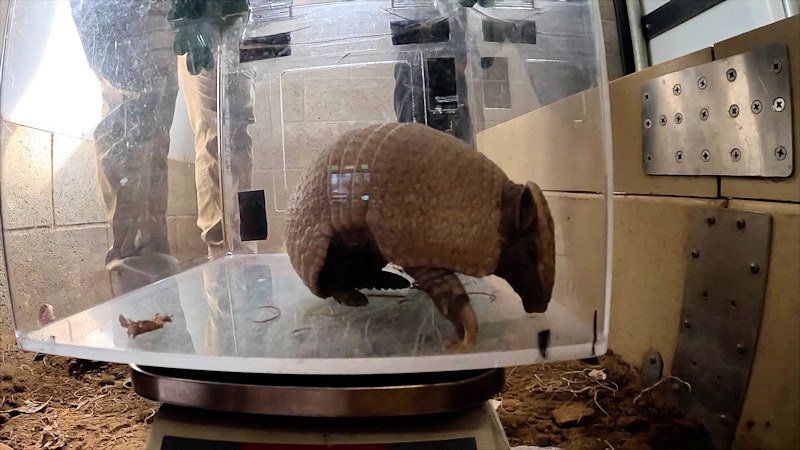It’s a boy, and he’s named ‘Bugsy’: Oregon Zoo welcomes roly-poly armadillo baby

PORTLAND, Ore. (KTVZ) — The Oregon Zoo’s armadillo family grew by three tiny bands last month as parents Max and Toby welcomed a new pup. According to care staff, mom and baby are doing well in their behind-the-scenes maternity den.
“Bugsy” — named for a favorite armadillo snack food, bugs — is Max and Toby’s second pup.
Though Bugsy was born on June 10, care staff only recently got a close look at him during his one-month health check.
“Max is a great mom, so we haven’t needed to step in at all,” said Eliza Lee, who oversees the zoo’s armadillo family. “She keeps him nice and cozy in their nest.”
The new pup is in good hands (or five-toed feet, in this case). Three-banded armadillos are the only armadillos that can roll into a ball for protection, allowing Max to create a safe and snug space for her new baby. Among the smallest of the 20 species of armadillo, adult three-banded armadillos weigh about 3 pounds. The pint-sized new pup weighs just 14 ounces, but keepers say he’s growing fast.
“He’s getting bigger every day,” Lee said. “He still stays close to his mom most of the time, but pretty soon he’ll start venturing out a bit and exploring his habitat.”
The pup had a quick veterinary checkup last week, but other than that care staff have been taking a hands-off approach to help the pair bond naturally. Max, Toby and their pup are in a private den behind the scenes.
Three-banded armadillos are native to the dry grasslands of eastern Bolivia, southwestern Brazil, Paraguay and Argentina. Unlike most armadillos, they do not dig for shelter, preferring to make their homes in abandoned anteater burrows. Their numbers in the wild are declining due to habitat loss, hunting and illegal pet trade.
Three-banded armadillos are listed as Near Threatened by the IUCN, the International Union for Conservation of Nature. Max, Toby and their new pup are part of the Association of Zoos and Aquariums’ Species Survival Plan for three-banded armadillos. The AZA has established SSPs for many threatened or endangered species — cooperative programs that help create genetically diverse, self-sustaining populations to guarantee the long-term future of these animals.